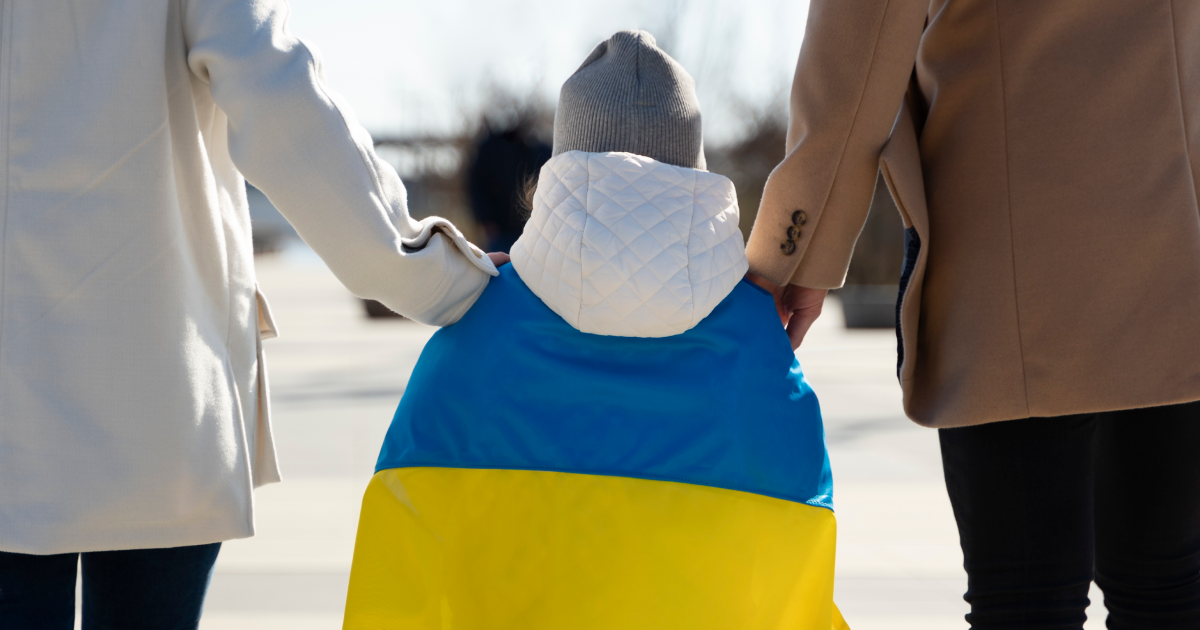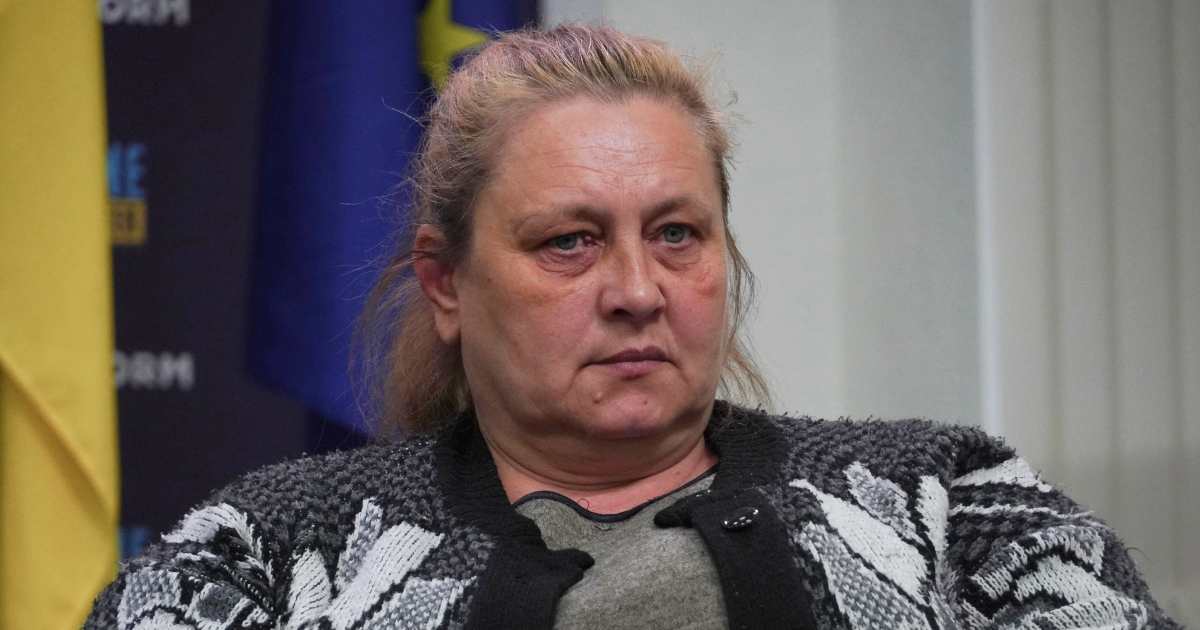Stories of deported children returned by Save Ukraine

On May 11, the Save Ukraine rescue network held a press conference showing evidence of Russia's crimes against Ukrainian children. Alina Kovalova, a 15-year-old girl from the Kherson region who was returned from Russian deportation, and her mother attended the event.
The Save Ukraine lawyer showed Alina the Russian documents that had been produced. The girl was issued a Russian-issued birth certificate, and fingerprints were taken, indicating that Alina was on her way to obtaining Russian citizenship.
Alina was deported in the autumn of 2022, a few days before the Ukrainian military de-occupied her home village. Now, amid rumours of a possible Ukrainian counter-offensive, Russians are massively deporting Ukrainian citizens from the Zaporizhzhia region.
This article tells the story of Alina and other children and how Russia abducts and deports Ukrainian children.
Deported children's stories
Alina Kovalova is a 15-year-old girl from the Kherson region who was returned from Russian deportation. In her village, Alina spent time with the children of local Yevheniia Kucherenko. Kucherenko has five children and is pregnant now. According to Alina's mother, Yevheniia interacted with the Russian military, cooked for them and washed their clothes.
Kucherenko intimidated Alina by saying:
Ukrainians will come and kill everyone who interacted with the Russians and took humanitarian aid.
So in October 2022, Alina stole a copy of her birth certificate from home and left for Russia with Kucherenko and her family.
"In the evening, my eldest son saw Yevheniia getting into a car and Russian soldiers taking her away. He came home and asked where Alina was. It turned out that she had also left," says Alina's mother, Svitlana.
The Russian military transported them to Krasnodar, and from there, by train and bus to Mordovia.
"Russia has a clear system to Russify Ukrainian children and destroy Ukrainian identity. Deported families are resettled in the regions, in this case in Mordovia, in a village where a house was abandoned. They give this house, issue all payments and benefits, and send children to a Russian school. No one asks where their relatives are or tries to find their parents," Myroslava Kharchenko, a lawyer for Save Ukraine, says.
Yevheniia Kucherenko took temporary custody of Alina and enrolled her in a Russian school. In November, Alina was included in the system of individual registration — the Russian Federation's register of social services, pensions and insurance contributions. In December, the child's fingerprints were taken, indicating that Alina was on her way to becoming a Russian citizen.

Shortly after Alina was taken away, the Ukrainian military de-occupied their settlement. Alina's mother, Svitlana, did not know where her daughter was for six months. Finally, they found her when they came across Yevheniia Kucherenko's Facebook profile.
The woman got in touch and gave Alina's number. So then, Svitlana began to communicate with her daughter. Later she contacted Save Ukraine, which helped her travel to Russia in April 2023 to pick up the child.

Alina was supposed to look after Yevheniia's children, and in conversations with her mother, she said that she regretted leaving. Later, Kucherenko began to interfere with their communication, smashed Alina's phone, and when she found out that Svitlana was going to Russia, she sent the child to a rehabilitation centre to avoid crossing paths with Svitlana.
"Yevheniia was interested in being paid for the children. She also received money for taking care of Alina," Svitlana shares.
How Russians psychologically manipulate children
Mykola Kuleba, CEO of Save Ukraine, Presidential Commissioner for Children's Rights (2014-2021), told Vlada's Pavliuk story. On October 7, the child was deported to the temporarily occupied Crimea. She spent seven months in the Luchistyi camp.

"Her grandmother-guardian was part of the fifth group of the Save Ukraine rescue mission and was on her way to pick up her granddaughter. After 14 hours of interrogation by the FSB, she got off the bus and died at the bus stop. The grandmother was cremated in Russia, and her ashes were returned to Ukraine.
The girl was in touch, waiting for her grandmother and wanted to return to Ukraine. The authorities could not take her away because there was no legal representative. After her grandmother's death, communication with the foundation's representatives showed that the girl was less willing to return to Ukraine," Kuleba says.
The camp director is a former Berkut officer named Astakhov, who defected to the Russians in 2014. Astakhov began taking the girl for walks, buying her clothes, promising that she would be adopted and telling her that poverty awaited her in Ukraine. Vlada has an aunt, brother and sister at home. During the sixth mission, one of the family members was granted legal representation with the relevant documents.
A few hours before the arrival of the legal representative, the girl was taken away in an unknown direction and was not allowed to communicate with her. Since April 22, the Foundation has had no information about Vlada Pavliuk. According to Kuleba, the child was subjected to psychological processing from the very beginning of her stay in the camp.
"I remember the case of a 12-year-old boy we brought back to Ukraine from a camp where he had been for six months. I asked him if he was afraid that he would stay in Russia forever. He said: "No, I wasn't afraid of that". I said: "Did you believe that they would come for you?" "No. I knew I would escape. I planned to escape, and I had a clear plan. The only thing stopping me was that I didn't have a clear plan for crossing the minefields on the contact line." This guy is now in one of our centres and is undergoing rehabilitation," Kuleba shared.
How Russia deports children
The charity Save Ukraine has carried out six missions to rescue Ukrainian children from Russia and returned 96 Ukrainian children from Russian captivity.
Mykola Kuleba spoke about the methods Russia uses to abduct Ukrainian children.
Manipulation, pressure and threats
Alina Kovalova and many other children are told that the temporarily occupied territories will not return to Ukraine, or vice versa — Ukrainian, American or European troops will come here to kill and rape.

Russians and collaborators take children to Russia, the temporarily occupied Crimea or Belarus under the pretext of "rest" or "rehabilitation". In children's camps in Russia and Crimea, they force children to learn Russian history, language and literature.
According to Save Ukraine, children of collaborators were the first to be taken to the camps. In this way, the organisation believes, the Russians were testing the collaborators for their willingness to cooperate. After the children returned from the camps, their example was used to recruit and take other children.
The primary purpose of the camps is to form children's attachment to Russia as a country that is supposedly ready to take care of them better than Ukraine, which shows Russia's strategy of assimilation and Russification of children.
For example, children from the Kharkiv region who were taken to Anapa were given new phones and Russian mobile cards, bought clothes, took on excursions and were entertained. They showed that Russians were ready to treat children well. After the territories were de-occupied, the children became hostages in the territory of the enemy, who decided not to return them to their parents. We had not found a case when someone from the Russian side tried to find parents or relatives, the CEO of Save Ukraine says.
In the places where children are taken, they are left unaccompanied and unattended. According to Russian law, guardianship officials can decide at their discretion whether a child has been without parents long enough to be granted orphan status, allowing them to be placed in families of Russian citizens.
Forced displacement, which Russians call "evacuation" and "rescue"
For this, they deliberately create inhumane conditions in the temporarily occupied territories. There is intimidation, arrests, no humanitarian or medical assistance, power cuts, no water, no heating or the possibility of leaving for the territory controlled by Ukraine. Travelling to Russia or other temporarily occupied territories is the only way to escape.
An example is what has been happening in the last week in the temporarily occupied territories of Zaporizhzhia. First, on May 5, the Russians announced the "evacuation" of civilians from 18 temporarily occupied settlements in the Zaporizhzhia region. Then, on May 11, the General Staff of the Armed Forces of Ukraine reported that within three days, the Russians had "evacuated" about 300 residents of the temporarily occupied territories of the Zaporizhzhia region to Berdiansk.
Abduction of children who lost contact with their parents during the full-scale war
These are children whose parents were imprisoned, held in filtration camps, hospitalised, died or went missing. These children get the status of "children who arrived on the territory of Russia without a legal representative". They are then sent to orphanages or Russian families.
This is what the whole world saw when Maria Lvova-Bielova, the Russian Commissioner for Children, took children out of Mariupol. There were 31 orphans among them; the rest were children whose parents were killed or missing in Mariupol. She took one child for herself, the others were sent to different regions, and later they were 'granted' Russian citizenship and placed in Russian families, Kuleba says.
Deportation of children brought up in residential facilities
The temporary occupation 'authorities' appoint their directors to institutions that make illegal decisions on the 'treatment' and transfer of children without the consent of relatives, parents or other legal representatives. The 'directors' also allow children to acquire Russian citizenship and submit relevant applications on their behalf.
"One child from the orphanage we returned had a biological mother and had been held hostage for almost six months. The child has serious illnesses, and as a result of the actions of the Russians, she was seriously injured. She was treated in a mental hospital after her return," Mykola Kuleba says.
Kateryna Rashevska, a Regional Centre for Human Rights (RCHR) lawyer, stressed that all children should be identified and a unified legal mechanism for their return home should be launched.
This requires a resolution at the UN General Assembly level and the efforts of all states. Ukrainian children should not be discriminated against compared to children in Syria, Iraq and other armed conflicts. There is a UN General Assembly resolution on them. As for Ukrainian children, there is none, Rashevska says.



